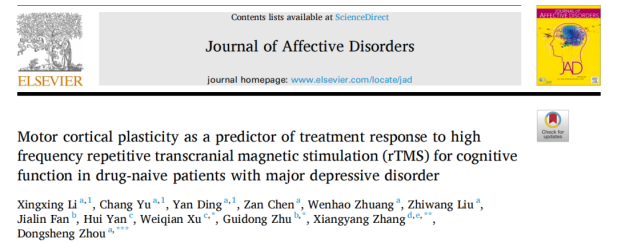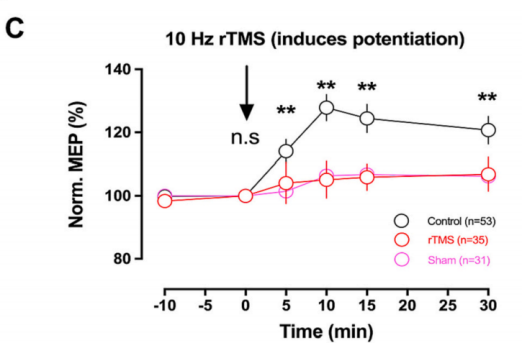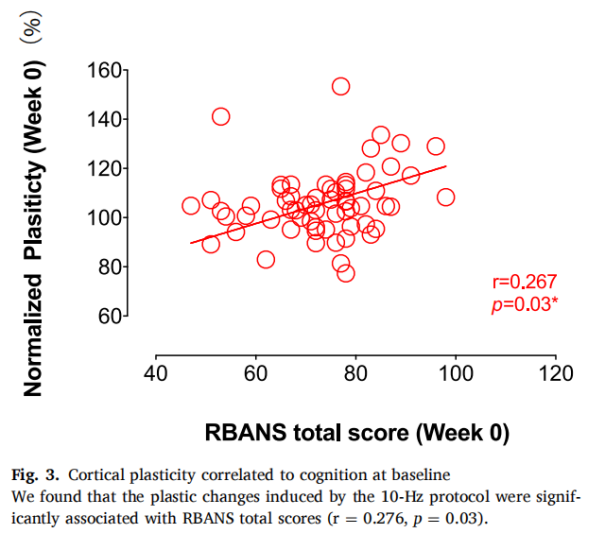Release time :2023-11-22
Source:support@yingchitech.com
Scan:1169
Clinical Support Department of Shenzhen Yingchi Technology Co.,Ltd.
Major Depressive Disorder (MDD) is the most common mental illness, usually accompanied by cognitive dysfunction, including impairment of attention, memory and executive functions, seriously affecting patients' quality of life. Although drugs can relieve patients' depressive symptoms, they do not improve patients' cognitive function, and some drugs can even cause serious side effects.
Repetitive transcranial magnetic stimulation (rTMS) was approved by the FDA in 2009 for the treatment of MDD patients. The main target area of stimulation is the dorsolateral prefrontal cortex (DLPFC). In addition, there is preliminary evidence that TMS can also improve cognitive functions in MDD patients, including nonverbal memory, attention, and executive functions. However, not all patients have significant improvements in cognitive function after intervention in the DLPFC, so a reliable electrophysiological index is needed to predict the therapeutic effect and cognitive function improvement of MDD patients in response to TMS.
A study published in May 2023 in the Journal of Affective Disorders(IF=6.6) by team of Zhou Dongsheng, director of Ningbo Kangning Hospital (Affiliated Mental Health Center of Ningbo University), suggested that motor cortical plasticity could be used as a potential biomarker to predict cognitive improvement in MDD patients.

A total of 66 MDD patients (35 in the experimental group and 31 in the sham stimulation group) and 53 healthy controls were included after screening according to the inclusion criteria.
Experiment procedure
①Detect cortical plasticity in MDD patients and healthy controls, and assess cognitive function and depressive symptoms in MDD patients
②20 sessions of TMS intervention for MDD patients
③Detection of cortical plasticity, cognitive function, and assessment of depressive symptoms in MDD patients
● Test group

● Sham stimulation group
The parameters are the same as above, the direction of the coil is inverted and placed in the left DLPFC, only sound, no stimulation.
TMS technology combined with MEP recordings was used to measure motor cortical plasticity in healthy controls and MDD patients at baseline and before and after 20 TMS treatments.
Take the average of 20 consecutive motor evoked potentials (MEPs) with 5 s intervals and measure their peak value. Take two baseline value points (10 min apart) and use the plasticity scheme if the difference between the two baseline values is less than 15%. MEPs were measured at 5, 10, 15 and 30 min after the plasticity protocol. Changes in MEP values (from peak to baseline) were measured to assess long-term potentiation-like (LTP) motor cortical plasticity before and after TMS.


All patients were assessed for cognitive and depressive symptoms at baseline and at the end of 20 intervention sessions.
Repeatable Battery of Neuropsychological Status Tests (RBANS): Assessing Cognitive Function
Hamilton Depression Rating Scale-24 (HDRS-24): Assess the severity of depressive symptoms
It can be seen from the MEP peak amplitude that the 10 Hz plasticity protocol induces long-lasting plasticity in cortical responses. In the healthy control group, 10Hz rTMS stimulation rapidly enhanced MEPs and lasted for at least 30 min, while it was significantly missing in the MDD group.

Studies have shown the connection between cognitive function and cortical plasticity in MDD patients and found that the plasticity changes induced by the 10Hz protocol were significantly positively correlated with the baseline RBANS total score, suggesting that there may be some common mechanisms for cognitive impairment and impaired cortical plasticity.

After 4 weeks of TMS intervention, compared with the sham stimulation group, the MEP values of patients treated with TMS were enhanced. Furthermore, increased plasticity (10 min time point) was significantly associated with improvements in total RBANS and immediate memory scores. However, no similar correlation was found in the sham stimulation group, suggesting that improvements in cortical plasticity may reflect the extent of cognitive improvement.

For the first time, 10Hz rTMS has been shown to be effective in the treatment of impaired cortical plasticity and cognitive impairment in MDD patients. Plasticity and changes in cognitive function are closely related, which may indicate that motor cortical plasticity plays a crucial role in cognitive impairment, and cortical plasticity can be used as a potential biomarker to predict cognitive improvement in MDD patients.
Antidepressant treatment is known to affect the level of cortical plasticity. It has also been shown that cortical plasticity in patients improves after effective antidepressant treatment, suggesting that it may be a marker of modifiable depressive symptoms. Some antidepressants also exert their antidepressant effects rapidly by altering plasticity. The deficiency of cortical plasticity in MDD patients may be the ultimate therapeutic target of antidepressants. TMS may exert the same effect as antidepressants, altering cortical plasticity while improving symptoms.
This study suggests that impaired cortical plasticity may play an important role in cognitive dysfunction in MDD patients. However, while the findings are encouraging, the study was limited to the motor cortex; It may be extended to other cortical regions in the future. At the same time, similar studies with large sample sizes are needed and patients with different disease courses are compared.
1.This content is organized by the Clinical Support Department of Shenzhen Yingchi Technology Co.,Ltd. Criticisms and corrections are welcome. For reprint, please indicate the source.
2.Reference: Li X, Yu C, Ding Y, et al. Motor cortical plasticity as a predictor of treatment response to high frequency repetitive transcranial magnetic stimulation (rTMS) for cognitive function in drug-naive patients with major depressive disorder. J Affect Disord. 2023;334:180-186. doi:10.1016/j.jad.2023.04.085